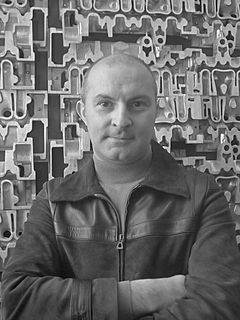A Quote by Arman
I have always been very much involved in the pseudo biological cycle of production, consumption and destruction. And for a long time, I have been anguished by the fact that one of its most conspicuous material results is the flooding of our world with junk and rejected odd objects.
Related Quotes
The effect of the post-Enlightenment project for human society is that all human activity is absorbed into labor. It becomes an unending cycle of production for the sake of consumption. The modern concept of "built-in obsolescence" makes this clear. The cycle of production and consumption has to be kept going, and the work of the artist or craftsman who aims to create something enduring becomes marginal to the economic order.
My writing is of a very different kind from anything I've heard about. All this mythological material is out there, a big gathering of stuff, and I have been reading it for some forty- or fifty-odd years. There are various ways of handling that. The most common is to put the material together and publish a scholarly book about it. But when I'm writing, I try to get a sense of an experiential relationship to the material. In fact, I can't write unless that happens ... I don't write unless the stuff is really working on me, and my selection of material depends on what works.
I shall argue that it is the capital stock from which we derive satisfaction, not from the additions to it (production) or the subtractions from it (consumption): that consumption, far from being a desideratum, is a deplorable property of the capital stock which necessitates the equally deplorable activity of production: and that the objective of economic policy should not be to maximize consumption or production, but rather to minimize it, i.e. to enable us to maintain our capital stock with as little consumption or production as possible.
I don't think we're crumbling as a civilization, but this is not our finest hour, and it's good to be mindful that we're all susceptible to fall and to look at what are the earmarks of a civilization on the wane. What are they - destruction of the environment? Conspicuous consumption? Heard of those?
We live in a supermarket of ideas, faiths, practices, theories, ideologies, and much else besides. Never in human history have there been so many movements and ideas struggling to attract our attention. Added to this, the Western world is swamped by material goods and the Western mind is dominated by the goal of material success. In all this confusion, Zen stands out as a voice of sanity. It represents a different way of seeing the world, one based upon the rediscovery of who we really are and have always been, through revealing to us our true nature.
The identifying personal association with objects, which are not personal, is an important modern experience - our real association, the strands of our feelings about the objects that surround us. It's also because they are so familiar, we don't think of them as important in the world, but actually they are the world. We are living in a very material world.
It is clear that everybody interested in science must be interested in world 3 objects. A physical scientist, to start with, may be interested mainly in world 1 objects--say crystals and X-rays. But very soon he must realize how much depends on our interpretation of the facts, that is, on our theories, and so on world 3 objects. Similarly, a historian of science, or a philosopher interested in science must be largely a student of world 3 objects.
For as long as there's life, for as long as we have things happening in the world, for as long as people haven't been able to work it, for as long as people are not trying to work it out, for as long as there's crime, destruction, hate, bigotry, for as long as there is a spirit that does not have love in it, I will always have something to say.







































